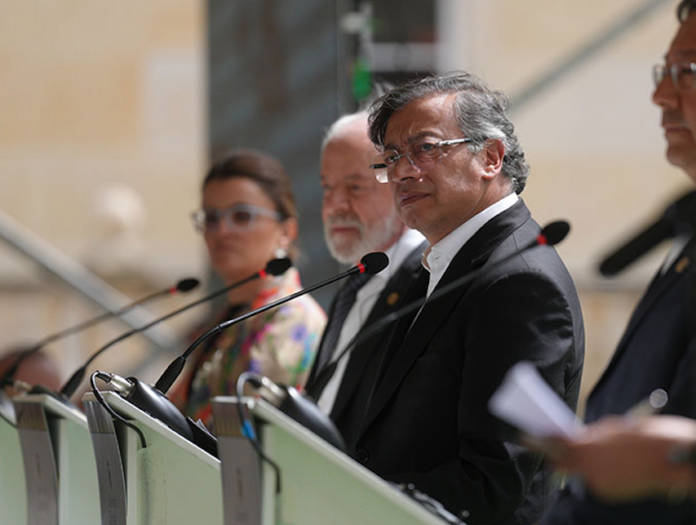Warships heading south through the Caribbean, threats peddled on social media, and the specter of a drug cartel that is testing the patience of the region’s leftist leaders — all of these elements are colliding this week as U.S. and Latin American officials grapple over the future of the Venezuelan dictatorship, Colombia, and the allegiances of President Gustavo Petro.
The drama intensified Monday after Venezuela’s Minister of the Interior and Justice Diosdado Cabello, and one of Nicolás Maduro’s closest ideologues, announced that 15,000 Venezuelan troops would be deployed along the Colombian border as part of the full-scale Bolivarian mobilization to counter an alleged invasion by the U.S.
Speaking on state television, Cabello claimed the move came with the “knowledge and cooperation” of the Petro government. His comments have shockwaves from Bogotá to Washington, where Republican lawmakers reiterate the alliance that exists between Petro and Maduro.
Almost immediately, U.S. Congressman Carlos Giménez from Florida, and a Cuban-born outspoken critic of Latin American leftist leaders, lashed out. On the social media platform X, he asked bluntly: “Mr. Petro, what Diosdado says – is it true, or are you going to deny it?”
Moments later, Giménez escalated his attack. “If Petro cooperates with Diosdado and the Cartel de los Soles (Cartel of the Suns), he would be complicit in a transnational drug trafficking enterprise and could be indicted by American justice,” wrote Giménez. In a follow-up post, he added: “Gustavo Petro just signed his own sentence. In the U.S. Congress, we will not take this as a joke. On the contrary, this is very serious.”
The timing of Giménez’s remarks could hardly be more combustible. Just days earlier, the Pentagon confirmed the deployment of additional U.S. Navy vessels to international waters near Venezuela, officially described as an anti-narcotics operation but widely interpreted as a show of force aimed at Caracas.
Venezuelan state media has been running near-constant commentary speculating about a potential U.S.-led invasion, while outlets stateside view the latest movement as asymmetrical warfare to intimidate Maduro, in the hopes that the regime will implode.
At the moment it appears that Washington has no appetite for a conventional ground war on the South American continent. The real U.S. endgame is not a battlefield victory, but betrayal from within. Within the Bolivarian Armed Forces after the U.S doubled it bounty to US$50 million for Maduro’s arrest.
On Sunday, the USS San Antonio steamed out of Norfolk, Virginia, armed with MV-22 Ospreys, to join the USS Iwo Jima Amphibious Ready Group and 22nd Marine Expeditionary Unit. Backed by Arleigh Burke-class destroyers and a Ticonderoga-class cruiser, the flotilla has positioned itself in international waters off Venezuela.
This naval deployment is billed publicly as part of Washington’s anti-drug trafficking mission. Privately, it is a flex: intimidation designed to remind Maduro’s generals that the world’s most powerful navy is sitting just over the horizon.
Petro, who has repeatedly framed himself as a bridge between the United States and Venezuela, fired back with his own statement. “The Cartel of the Suns does not exist,” he insisted. “It is the fictitious excuse of the extreme right to overthrow governments that do not obey them. The passage of Colombian cocaine through Venezuela is controlled by a drug trafficking directorate, whose bosses live in Europe and the Middle East.”
He went on to describe his own diplomatic proposal: “I proposed to the U.S. and Venezuela that we together destroy that cartel. It is about coordinating, not subjugating. The political problem in Venezuela must be resolved among Venezuelans themselves, through dialogue and more democracy. A decarbonized Venezuela should be the goal: The Great Colombia, a world power of life and an essential pillar of Latin American unity and peace.”
The contrast between Petro’s lofty vision of a “decarbonized Venezuela” and Giménez’s charge that the Colombian president is entangled with a drug syndicate underscores just how polarized the scenario has become.
For Washington, the “Cartel of the Suns” – named after the sun insignia on Venezuelan military uniforms – has long been shorthand for allegations that senior Venezuelan generals have enabled or directly profited from cocaine smuggling through the country. U.S. prosecutors have filed charges against Maduro himself, accusing him of “narco-terrorism,” and Cabello has been sanctioned. But Petro’s outright denial of the cartel’s existence marked one of the clearest breaks yet with the official U.S. stance.
Giménez, who previously labeled Petro a “pawn of the dictator Nicolás Maduro” and once called him a “corrupt drug addict,” has shown no sign of softening his attacks. His latest salvo hinted at possible legal consequences – a rare suggestion that a sitting Colombian president could be indicted under U.S. law if links to transnational narcotics groups were proven.
Meanwhile, the naval build-up is fueling unease across the region. On one side, you have the U.S. flexing its muscles in the Caribbean, on the other, Venezuela militarizing its border. With Petro caught in the middle, the Colombian president has doubled down on his insistence that Venezuela’s crisis must be solved internally, warning that foreign intervention would only deepen the chaos.
For now, the rumors of an imminent invasion are just rumours. The White House has avoided public comment on Cabello’s troop deployment. But in Bogotá, the sense of uncertainty is palpable – a reminder that in Latin America, the line between rumor and reality can blur quickly.
The U.S. does not need to – and likely never will – land Marines in downtown Caracas. The costs of a large-scale ground war in Latin America is politically and militarily prohibitive. Instead, Washington is waging a war of nerves: sanctions to choke oil revenue, warships to project strength, indictments to delegitimize adversaries, and bounties to fracture loyalties within Maduro’s inner circle.
As Petro seeks to chart a path between cooperation with the U.S. and solidarity with Maduro, his balancing act is becoming increasingly precarious. And with every new troop movement, naval maneuver, or social media narrative, the stakes for Colombia’s president rise a little higher.

